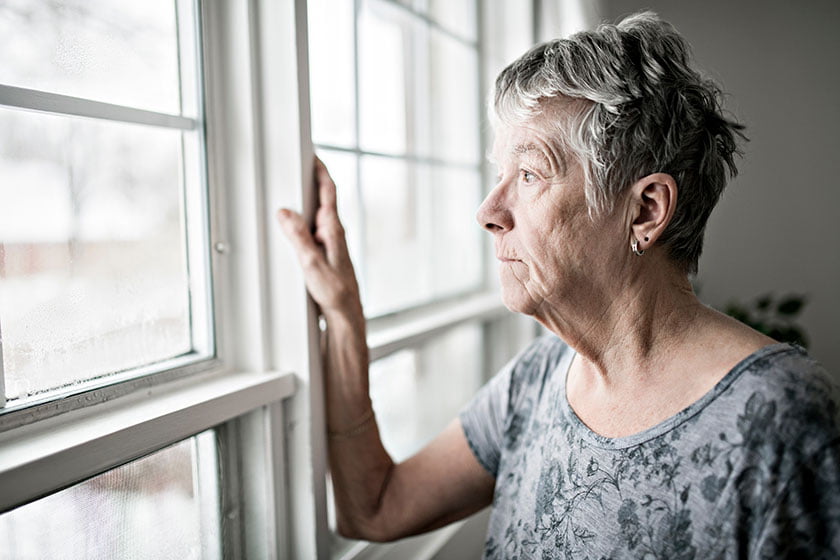
Using Pastoral Volunteers to relieve mild depression in dementia sufferers
Out of a Darkened Room
Many people in residential care suffer from dementia and some degree of depression. This can lead to a loss of self-esteem, apathy, sadness and isolation as they disengage themselves from the people and activities around them. An innovative program, established at Tregenza Avenue Aged Care Service1 recruits volunteers from local churches to visit people with dementia, is providing a practical and caring way to alleviate depression, encourage a more positive outlook and re-engage the residents in daily living.
Mild Depression in Aged Care Residents
According to Tolman, “mild depressive symptoms can include sadness, loss of interest in activities or pleasures, low self-esteem, changes in sleeping or eating patterns, poor attention and concentration, and an ongoing negative outlook on the future.”2 These symptoms may be present in all residents but the particular focus of this article is on residents who suffer from both depression and dementia. The apathy and sadness of this group of residents is complicated by the fact that dementia can cause changes in the brain leading to withdrawal; however Mace and Rabins3 write that depression may also be present in dementia sufferers. Dementia coupled with depression leads to a very poor quality of life. Depression may lead to these residents sitting alone in their darkened bedrooms with the curtains drawn, refusing to get dressed and very reluctant to join in activities despite encouragement from staff. It is recognised that some elderly people disengage from life and prefer to sit happily alone in their rooms. Such people are not depressed and are solitary rather than socially isolated. This paper does not apply to them.
Causes of Depression
There may be many reasons why residents become depressed. These include spiritual emptiness and lack of meaning that can come with old age and infirmity, the grief and loss experienced when leaving one’s home, and a sense of shame when negative responses are elicited from other people.
Spiritual Emptiness and Lack of Meaning
Spiritual issues are an important factor in depression. Old age is a time of reflection in which people ponder the meaning and purpose of their lives. According to Erik Erikson4 those who are happy with the choices and decisions they have made or at least accept the consequences of those choices, enjoy a state of ego integrity and are relatively peaceful. Others regret the course of their lives, as there is now no more time to choose a different life partner or follow a different career. These people may sink into a state of despair. Henri Nouwen5 discusses the two ways of ageing along similar lines; the way of darkness or the way of light. Ageing can be a time of great difficulty where grief and loss is overwhelming and the person experiences depression and thus walks the way of darkness. Alternatively, some individuals, despite great suffering, manage to walk the path of light.
The residents in the program walked the way of darkness and were in despair. Those in High Care, lacked verbal ability but could still make their feelings known.
One woman said bitterly “I’m dead. I’m dead. there is no God.” Then she paused and said in a puzzled tone, “I love God.”
Her deep sense of despair at her condition, and her confusion about God and why this had happened to her were exacerbated by her failing ability to use words.
Another woman, unable to speak, could spell out simple words on a communication board. She spelled out to her pastoral visitor, “die, die, die.”
Grief and Loss
Marikis6 writes that depression may be caused by loss of attachments. The residents in the program have all suffered significant losses and experience grief to varying degrees. These losses include,
- the death of friends and family, including children and grandchildren and the consequent loss of intimacy
- loss of country of origin as many were immigrants
- loss of home and possessions
- loss of the ability to do things, e.g. art, craft, sewing and woodwork
- loss of career
- loss of health and strength
- loss of mental capacity
When a person enters an aged care facility, it is expected that they will grieve for some time over the life that is lost. This is part of everyone’s experience. Successful resolution of the grieving process means that the resident can begin to build a new life in the facility which can be enjoyable and fulfilling.
Some of the residents suffering from dementia are able to cope with this process quite well, while others, both cognitively and non-cognitively impaired, are unable to move to this point and slip into depression.
Loss of Autonomy Leading to Shame
A great sense of shame often characterises people who suffer from dementia. Most of the residents in the program express great concern at having memory problems.
One woman said repeatedly to the chaplain, in a worried tone of voice, “I’m not right in the head dear.”
Another said sadly, “I’m just a waste of space”, and another “I’ve got cotton wool between the ears”.
This deep sense of shame seems to exacerbate symptoms of depression. The shame is cause by a loss of autonomy as the person with dementia is no longer properly in control of their own functioning. They may need assistance with showering, dressing, toileting and perhaps eating. Erikson7 states that between the ages of 18 months to 3 years the child becomes autonomous, learning the basic routines of life such as toileting, eating, dressing and bathing. If this stage is coped with well, the child goes on confidently to the next stage; however those who have difficulty at this point are afflicted with shame and self-doubt. It would appear, that in old age, when one must be assisted with these necessary functions of life, the old feelings of childhood shame reappear.
One woman said angrily, “I have never bared myself as much in my whole life as I have in this place: how awful for the staff to see my old body.”
Reactions of Other People
Family, friends and other residents often find it difficult to relate to someone who has dementia. If they have never encountered dementia before they can become frightened, angry and rejecting, which leaves the resident feeling isolated and lonely.
One resident who is deeply in denial, maintained there was nothing wrong with her memory and refused to believe that she told the same stories over and over again. Her depression was exacerbated by the hostile reactions of her family toward her. They could not understand why she denied something so obvious, and frequently told her so. They were also angry with her for repeating herself so often. The resident could not understand what she had done wrong and was very depressed with frequent bouts of crying and sadness. It required considerable work with this family to help them to understand the disease and to modify their behaviour. It also took the pastoral visitor 14 months of weekly visits to help the resident regain some of her self esteem, using attentive listening, empathy, and reassurance.
Methods of Addressing the Problem
It is very difficult to help people who suffer from dementia and depression. Medication is helpful but is not enough on its own. The talking therapies are difficult to use because the resident may have lost some or all of their capacity to use and understand words. Even if the resident still has speech they may lack the insight to alter their thought patterns and behaviour and are likely to forget any insights that have been attained. Nevertheless altering the person’s environment with meaningful relationships and interesting and enjoyable activities gives promising result.
This latter approach is congruent with the approach of the Mood Disorders Association of South Australia8, who recommend a series of measures for limiting depression. These include, getting emotional support and talking to an understanding non-judgemental person, using whatever spiritual resources you are comfortable calling on, getting some exercise, getting out into the sunlight, and taking part in some enjoyable activities.
There is an excellent varied program of activities at TAACS in which residents can participate, and which helps to alleviate depression. The program improves the residents’ quality of life which leads to an improvement in self esteem. The sense of wellbeing that is generated from such participation lasts beyond the actual experience even if the activities cannot be remembered. However it is extremely difficult to entice those residents suffering from dementia and depression, out of their darkened rooms in order to take advantage of the activities on offer. The staff strongly encourage the residents to get dressed and go out, with little success. The autonomy and choice of residents is very important and so a decision to stay at home must be respected. The withdrawal of these residents means that it is very difficult to help them.
The Pastoral Care Program
As Chaplain, I became aware of the experience of grief, loss, shame, and a sense of meaninglessness that seemed to lead some residents into depression. I also discovered how resistant some of them were to changing the depressing nature of their situation. In order to address this situation pastoral visitors were recruited from local churches to visit these residents regularly and the program began to evolve.
In time we found that residents, suffering from depression, were willing to leave the safety of their darkened rooms. When accompanied by a pastoral visitor, they would begin to take part in the activities program. In some instances, this progressed to involvement in diversional therapy activities when the pastoral visitor was not present. This significantly alleviated the depression of these residents.
After interviewing the pastoral visitors in depth about the methods and techniques they used, a pattern of strategies emerged. The strategies described are used with resident in low care and in independent living. Work with the high care residents has not been analysed.
Strategies
- The pastoral visitors are carefully matched with the residents with respect to compatible interests and personalities.
- The residents are given control over the process at all times. When discussing the possible visit with a resident the chaplain stresses that the first visit is on a trial basis only and that the process can be stopped at any time at the resident’s request. This strategy helps to partially redress the power imbalance between the resident and the pastoral visitor. A power imbalance is always present in a relationship when one person is free to come and go as they wish and the other is infirm and not able to completely look after themselves.
- The visits begin in the resident’s room as this is familiar territory which gives the resident a sense of control over the situation as it is happening on their patch. Sometimes the resident is dressed in day clothes and sometimes not.
- A warm accepting, non-judgmental relationship is established. This is the most important part of the process as it is the medium through which everything else happens. The characteristics of the relationship are described below. The resident now progresses out of the darkened room. After visiting for a few times it is possible for the pastoral visitor to suggest having a cup of tea together in the lounge room. This is always agreed to as it is normal practice to entertain a visitor in the lounge rather than the bedroom and so a pleasant hour is spent out of the darkened room.
- On a subsequent occasion the pastoral visitor suggests going out to the Community Centre for a cup of tea. (At TAACS the Community Centre is in a separate building.) Once more it is normal for friends to go on an outing together and so the resident is prepared to leave the safety of the residential house and walk up the street to the Community Centre. Thus another step is taken out of the darkened room.
- Sometime later the pastoral visitor will suggest accompanying the resident to an activity at the Community Centre such as a concert. Once more this invitation is usually taken up. It is very frightening to join in with a group of people when you feel that you have lost control of your mind. Some of the residents are naturally shy as well and find it difficult to make new friends. If a person can go with a friend or a pastoral visitor, then the whole experience becomes easier.
- As the resident attends the Community Centre more regularly he or she is able to make friends and become be less dependent on the Pastoral visitor.
The timing of this process is most important as the pastoral visitor needs to move at the pace of the resident. It is also important for the resident to maintain equal power with the pastoral visitor.
One pastoral visitor reported that it took many weeks before the resident consented to leave her room and go to the Community Centre. At first she didn’t talk to the others and just cried all the time and wanted to return home. The pastoral visitor constantly reassured her that she would be all right. As the weeks passed, and she became more familiar with the surroundings she cheered up and was more outgoing. Eventually she began to play Bingo and the pastoral visitor sat with her. Then she played cards or just chatted to the other people. After a few months she was happy for the pastoral visitor to leave her for a while. Eventually she was able to attend the Community Centre on her own.
Another resident had retreated to her room when her dementia became apparent. She had stayed there for most of the time for two weeks when a nurse requested a pastoral visitor. On the first visit the resident decided to show the pastoral visitor around so she got dressed and they went across to the Community Centre. They visited the Community Centre every week thereafter.
The Relationship
When considering the reasons why the pastoral visits make such a difference, it seems that the relationship is all important. Significant characteristics include, provision of an opportunity for intimacy; “ordinariness”, warmth, empathy, non-judgemental attitude, and acceptance of the resident as an adult. The relationship helps the resident to walk in the “way of light.”
Opportunity for intimacy- “your own special person”
One of the day clients commented wistfully to a resident who was drinking coffee with the pastoral visitor at the Community Centre, that she was lucky to have her own special person. The resident replied that it was like that. She went on to say that everyone at TAACS is lovely but it helps to have your own special person.
The other residents recognised that the relationship belonged to that particular resident for that day at least and was not shared with others in the Community Centre. It provided him or her with a confidante and an intimate friend. Elizabeth MacKinlay writes that “intimacy is as important in ageing as at any other point of the life cycle. For any single older adult, …. the question of access to confidantes and intimates arises.”9 The pastoral visitor helps to meet that need.
The relationship is an ordinary part of life
In the 1970’s Nirje and Wolfensberger10 developed the principle of normalisation, (later reworked and renamed “social role valorisation”). This principle was applied to people with intellectual disabilities, but is also relevant to the management of other groups, including the aged in residential care. Wolfensberger defines the normalisation principle as “utilization of means which are as culturally normative as possible in order to establish and/or maintain behaviours and appearances that come close to being as normative as circumstances and the person’s behaviour potential permit”. Normalisation is both a process and a goal.
This principle can be clearly seen in the relationship between the pastoral visitor and the resident. The pastoral visitor is a person who comes in from the local community. He or she is not paid and has no function within TAACS, other than to visit the resident as an ordinary guest. This has proved to be a very powerful factor in the success of the relationship and in helping the residents to leave their darkened rooms.
In the early stages of the relationship one resident would greet the pastoral visitor with “Hello love, good to see you. Oh, I should get dressed. I shouldn’t be sitting around in my dressing gown.”
When the resident progressed to having coffee or tea in the lounge it was in response to the “normality” of the situation where one entertains guests in the lounge not the bedroom. Going out for coffee with a friend, made visiting the Community Centre, seem a most natural thing to do.
The relationship is warm, empathic and non-judgemental
The relationship needs to be warm and sensitive to the resident. It also needs to be non-judgemental and accepting of the resident as an adult regardless of any impairment. Many people with dementia are treated as though they are mad or childlike by their relatives and others. It is most important that they are treated with respect. However the pastoral visitor is not a therapist.
There is much mutual sharing of stories and talk about everyday things. A pastoral visitor said that there is a lot of laughter as the resident whom she visits has a wonderful sense of humour. The pastoral visitors talk about spiritual issues if the residents want this but do not push their particular perspective.
As the resident gets to know and like the pastoral visitor they come to see themselves as an interesting likeable adult rather than a sick person who is grossly defective. The resident is able to accept the pastoral visitor’s definition of them as likeable and their self labelling changes accordingly. This greatly helps their self esteem and reduces some of the crippling sense of shame.
The Way of Light
The relationship helps the resident to walk the way of light rather than darkness and despair. According MacKinlay, meaning in life can be found through relationships. She writes, “Meaning expressed through human relationship involves support and the need for connection with others”11. In her study she found that some informants “derived the greatest meaning in their lives through other human relationships, outside the family.”
A loving relationship in which the well being of the other person is paramount embodies the love of God. Thus the pastoral visitors bring God’s love to people who perhaps, do not believe or have lost the sense of God that they once possessed. Once a person is loved by another, they can love themselves and are better able to relate to the Ultimate Source of Being that we call God.
The Pastoral Visitors
This program would not be possible were it not for the voluntary work of the pastoral visitors. They are recruited from local churches and I have found that it is best to speak to groups of people directly, in church services or church clubs rather than ask the minister/priest to recommend someone. This needs to occur several times before people respond. They also need to hear the story themselves in order to decide if pastoral visiting is right for them. They are able to catch a sense of enthusiasm and passion that is better conveyed first hand.
Not everyone is suitable for this work, so not all applicants are accepted. The applicant needs to be sensitive, caring and able to listen to others. Patience is also an important characteristic for those working with dementia sufferers.
One pastoral visitor said that she has to listen very empathically, patiently and with interested attention, as the same concerns, griefs and feelings of shame are repeated each week.
The pastoral visitors are trained in an ongoing program. Group sessions cover topics such as:
- Spirituality of Ageing
- Grief and Loss
- Understanding Dementia
- Understanding Depression
- Communication and Listening Skills
- Understanding the Boundaries of the Relationship with Resident
- Training, support and supervision by the chaplain, also occur on a one to one basis. It is important that problems are dealt with as they arise and the pastoral visitors have the satisfaction of sharing their joys and concerns with someone else.
Each pastoral visitor is accepted on a trial basis for three months and if successful, is then accredited by the pastoral care committee for 12 months at a time. Each year, there is an interview with the coordinating chaplain in order ascertain if there are any problems, and to decide on training needs and areas for improvement.
Conclusion
By using members of the community recruited from local churches, it is possible to alleviate the depression of residents who also suffer from dementia. The four main causes of depression in these residents, viz. spiritual emptiness and lack of meaning, grief and loss, shame, and the negative reactions of other people, are mitigated through their relationships with the pastoral visitors. These relationships are warm, empathic and intentional. The program is effective because the pastoral visitors are ordinary people who come in from outside the organisation. As the program also takes a great deal of time and patience, the cost would be prohibitive if professional staff were used. The pastoral visitors enable the work of the Chaplaincy Service at TAACS to be greatly improved and extended.
1 Tregenza Avenue Aged Care Service was a State Governnment facility located in Elizabeth, a satellite city north of Adelaide. The facility comprised high care, low care and independent living accommodation. The residents lived in separate 5 bedroom houses with a separate administration block and community centre.
2 Tolman, Anton O.; “Depression in Adults” (2nd edition) Compact Clinicals, 2002, p1.
3 Mace, Nancy, L. & Rabins, Peter V., “The 36-Hour Day: A Family Guide to Caring for Persons with Alzheimer’s Disease, Related Dementing Illnesses, and Memory Loss in Later Life”. The John Hopkins University Press,Baltimore, 1991, p144.
4 Erikson, Erik, “Childhood and Society”, Imago Publishing Company, Great Britain, 1951. p241
5 Nouwen, Henri J.M. & Gaffney, G. “Aging: The Fulfillment of Life”, Doubleday, New York, 1976.
6 Marikis, D., “Depression: Biological, Psychological and Social Issues”, Cortext Educational Seminars, 2002.
7 Erikson, Erik, op.cit., p247
8 Mood Disorders Association of SA. Pamphlet
9 MacKinlay, E., “The Spiritual Dimension of Ageing” Jessica Kingsley Publishers, London and Philadelphia, 2001, p202.
10 Wolfensberger, Wolf, “The Principle of Normalisation in the Human Services”, National Institute on Mental Retardation, 1972, p181.
11 MacKinlay, E., op.cit. p203
Rev Dr Elizabeth Vreugdenhil, Ecumenical Coordinating Chaplain, Tregenza Ave. Aged Care Service (TAACS) (2000-2003)
Adapted from a paper presented at a Conference on “Dementia and Depression” sponsored by The Hammond Group in 2002. An abridged version was published in National Healthcare Journal August 2002 pp 42-43




